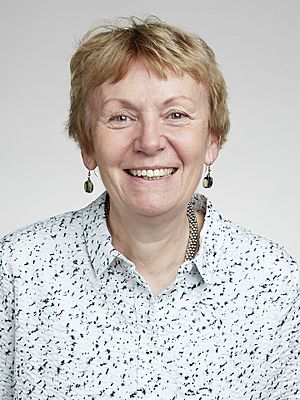Maria Fitzgerald facts for kids
Quick facts for kids
Maria Fitzgerald
FRS FRCA FMedSci
|
|
|---|---|

Fitzgerald in 2016
|
|
| Born | 10 April 1953 |
| Education | Godolphin and Latymer School |
| Alma mater | |
| Awards | Joan Mott Prize Lecture (1996) |
| Scientific career | |
| Fields | |
| Institutions | University College London |
| Thesis | The sensitisation of cutaneous nociceptors (1978) |
| Doctoral advisor | Patrick David Wall |
Maria Fitzgerald is a famous British scientist who studies the brain and how it feels pain. She is a professor at University College London (UCL), where she researches how pain works, especially in babies and young children. Her work has helped doctors understand that even very young children feel pain and need proper treatment.
Early Life and Education
Maria Fitzgerald was born in London, England, on April 10, 1953. Her mother, Penelope Fitzgerald, was a well-known writer who won a special award called the Booker Prize. Her father, Desmond Fitzgerald, was a military officer. Her older brother, Edmund Valpy Fitzgerald, also became a professor.
Maria went to Godolphin and Latymer School when she was younger. Later, she studied physiology at Lady Margaret Hall, Oxford, which is part of the University of Oxford. Physiology is the study of how living things work. She earned her first degree from Oxford in 1975.
After Oxford, Maria continued her studies at University College London. There, she focused on how pain works in the body and brain. She worked with important scientists like Bruce Lynn and Patrick David Wall. In 1978, she earned her PhD, which is a very high academic degree.
Maria started her research career with a grant in 1981. A grant is money given to scientists to help them do their research. Since then, her work has always been supported, allowing her to keep studying pain. In 1984, she became a lecturer at UCL. Today, she is a Professor of Developmental Neurobiology at UCL. This means she studies how the brain and nervous system develop, especially concerning pain.
Research and Career
Professor Fitzgerald's research focuses on how pain signals travel through the body and brain, especially in babies and young children. She studies nociceptors, which are special nerve cells that detect harmful things and send pain signals.
Her work has greatly changed how we understand pain in early life. She has shown that how a baby experiences pain can affect how sensitive they are to pain later in life. Before her research, some people thought babies didn't feel pain as much as adults. Maria Fitzgerald's studies proved that babies do feel pain and need careful attention and treatment.
Thanks to her research, doctors now know that pain treatment for children needs to be different from adults. It should be chosen carefully based on the child's age and how much they have developed. Her work has made a big difference in how medical professionals care for young patients.
Awards and Honours
Maria Fitzgerald has received many awards for her important work.
- In 2011, she won the Jeffrey Lawson Award for Advocacy in Children's Pain Relief from the American Pain Society. She was the first basic scientist to get this award.
- In 2013, she was elected to the Faculty of Pain Medicine of the Royal College of Anaesthetists. This was in recognition of her major contributions to pain medicine.
- She became a Fellow of the Academy of Medical Sciences in 2000.
- In 2016, she was elected a Fellow of the Royal Society. Being a Fellow of the Royal Society is a very high honour for scientists in the United Kingdom.
- She has also been given honorary memberships in several important groups, including the International Association for the Study of Pain and the British Pain Society.
You can listen to a podcast about her research career on the Pain Research Forum website.
 | Jackie Robinson |
 | Jack Johnson |
 | Althea Gibson |
 | Arthur Ashe |
 | Muhammad Ali |

